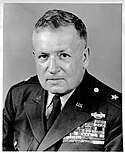S. L. A. Marshall Quote
Related Quotes
Christians sometimes make themselves into elephants afraid of mice. You have the Creator of the universe on your side; not to mention, you've been given eternal life. 'Whom or what shall you fear?' To...
Criss Jami
Tags:
anxiety, apologetics, bravery, christ, christ jesus, christian, christianity, courage, darkness, death
About S. L. A. Marshall
Brigadier General Samuel Lyman Atwood Marshall, also known as SLAM, (July 18, 1900 – December 17, 1977) was a military journalist and historian. He served with the American Expeditionary Forces in World War I, before becoming a journalist, specialising in military affairs.
In 1940, he published Blitzkrieg: Armies on Wheels, an analysis of the tactics used by the Wehrmacht, and re-entered the U.S. Army as its chief combat historian during World War II and the Korean War. He officially retired in 1960 but acted as an unofficial advisor and historian during the Vietnam War. In total, Marshall wrote over 30 books, including Pork Chop Hill: The American Fighting Man in Action, later made into a film of the same name, as well as The Vietnam Primer, co-authored by Colonel David H. Hackworth.
His most famous publication is Men Against Fire: The Problem of Battle Command, which claimed that fewer than 25% of men in combat actually fired their weapons at the enemy. While the data used to support this has been challenged, his conclusion that a significant number of soldiers do not fire their weapons in combat has been verified by multiple studies performed by other armies, going back to the 18th century and continuing into the 20th.
Why this is so remains contested; Marshall argued that even with their own lives at risk, the resistance of the average individual “...toward killing a fellow man" was such that "he will not...take life if it is possible to turn away from that responsibility and at the vital point, he becomes a conscientious objector". Others argue so-called 'low fire' is a function of training and discipline, and is a positive attribute. These debates continue since understanding is crucial to overcoming them through training, as well as dealing with actual or potential combat-stress disorder.
In 1940, he published Blitzkrieg: Armies on Wheels, an analysis of the tactics used by the Wehrmacht, and re-entered the U.S. Army as its chief combat historian during World War II and the Korean War. He officially retired in 1960 but acted as an unofficial advisor and historian during the Vietnam War. In total, Marshall wrote over 30 books, including Pork Chop Hill: The American Fighting Man in Action, later made into a film of the same name, as well as The Vietnam Primer, co-authored by Colonel David H. Hackworth.
His most famous publication is Men Against Fire: The Problem of Battle Command, which claimed that fewer than 25% of men in combat actually fired their weapons at the enemy. While the data used to support this has been challenged, his conclusion that a significant number of soldiers do not fire their weapons in combat has been verified by multiple studies performed by other armies, going back to the 18th century and continuing into the 20th.
Why this is so remains contested; Marshall argued that even with their own lives at risk, the resistance of the average individual “...toward killing a fellow man" was such that "he will not...take life if it is possible to turn away from that responsibility and at the vital point, he becomes a conscientious objector". Others argue so-called 'low fire' is a function of training and discipline, and is a positive attribute. These debates continue since understanding is crucial to overcoming them through training, as well as dealing with actual or potential combat-stress disorder.
